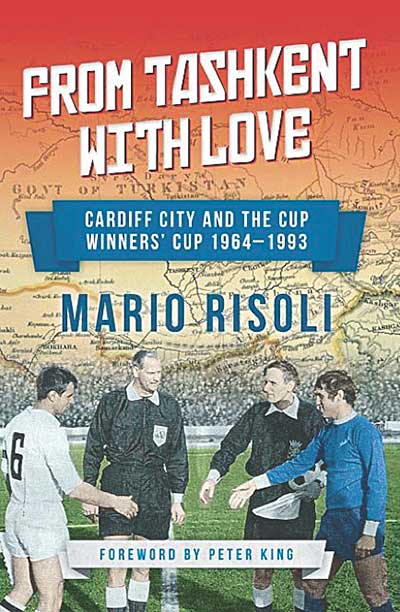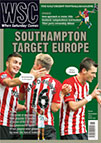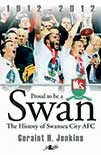Search: ' John Toshack'
Stories
 Cardiff City and the Cup Winners Cup 1964-1993
Cardiff City and the Cup Winners Cup 1964-1993
by Mario Risoli
St David’s Press, £16.99
Reviewed by Huw Richards
From WSC 338 April 2015
Collective memory tends to privilege the ancient and modern at the expense of what came in between. For Cardiff City the FA Cup win in 1927 looms with the same symbolic weight as 1966 does for England fans, while recent recall summons up unwanted red shirts, thwarted promotion campaigns and misery last season.
Mario Risoli, an expert preserver of Welsh football’s past, aims here to reclaim a time when Cardiff combined being a lower-division club at home with redoubtable warriors in Europe. It needed recovering. That these achievements were in a tournament which no longer exists, and enabled by a route Cardiff can no longer take – winning the Welsh Cup – cuts institutional continuities. And while the last venture was in 1993, the core of this history (and two thirds of its length) is contained in the years between 1964 and 1971.
Risoli draws on press archives and an outstanding collection of interviews with former players. They offer a vivid picture of European competition before it was subsumed to club business plans, as a glorious break from mundane reality and, in a less travelled age, a venture into the unknown.
Even that future footballing cosmopolite John Toshack could recall of the food in Tashkent in 1968: “It was like dog food. The only thing that we could eat were these big bread rolls. We called them discuses.” Entrepreneurial players took chocolates, ties and socks to sell in Moscow, only as Bobby Ferguson recalls: “We ended up eating most of the chocolate and giving the rest away because the people were so nice.”
Along with the tales of Cardiff stalwarts such as Peter King, who contributes a fine foreword, and Don Murray are glimpses of more widely remembered careers, bracketed by John Charles’s last great display at Sporting Lisbon in 1965 and Robbie James’s final senior goal, scored in defeat by Standard Liege in 1993. At the book’s heart is a compelling warts-and-all picture of Jimmy Scoular, Cardiff’s manager from 1964 to 1973 – so competitive he would kick players in a Friday afternoon five-a-side, given to tirades of abuse and arbitrary decisions and paranoid about all foreigners, yet still cherished by many of his players.
And the title gets it right. Beating Real Madrid 1-0 in 1971 is the most remembered achievement of this whole period. Yet the truly historic feat was the extraordinary expedition of 1968, passing through Breda, Moscow, Tashkent and Augsburg en route to a semi-final defeat by Hamburg which ranks for heartbreak alongside the missed penalty that cost Cardiff the League title in 1924. Risoli might perhaps have made more of fan memories and put his excellent game-by-game narration more into the wider context of the club’s history. There should certainly have been an index included. But with all that, he has produced both a great read and a real contribution to football’s collective memory.
 Huw Richards reviews Swansea City documentary Jack To A King, charting the club’s rise to the Premier League
Huw Richards reviews Swansea City documentary Jack To A King, charting the club’s rise to the Premier League
That the Swansea City film documentary Jack To A King briefly had a higher average score than perennial “best ever” The Shawshank Redemption on the IMDB film website is as statistically meaningful as the league tables newspapers insist on printing after one match. But approval from amateur reviewers and short extensions to planned runs in four west Wales cinemas suggests that JTAK – out on DVD and digitally in December – is a hit with its target audience, and with good reason.
It looks terrific, has big-screen production values and vividly recalls familiar scenes and stories. There is achingly evocative footage of the old Vetch Field and some great match action. The film-makers found compelling voices. James Thomas, whose goals kept the Swans in the league in 2003, is gently amiable while Leon Britton is engaging, observant and thoughtful. Fans of all clubs will recognise the feelings director Martin Morgan describes from the Championship play-off final against Reading, while fellow director David Morgan gives the narrative its emotional core.
The quality of those voices made it possible to dispense with traditional documentary props. There is no voiceover narrator or outside expert analysis – although the happy accident that fan Huw Bowen is also Professor of History at Swansea University enables some valuable perspective-setting – and no captions introducing speakers. This last may leave those not in the know a little puzzled at times.
Bookending Swansea’s recent history with the galvanising battle against unpopular owner Tony Petty in 2001 and promotion to the Premier League a decade later makes dramatic sense. Securing an interview with Petty was a coup, but his pleas in mitigation are outweighed by clear evidence that he was not, as asserted at the time, the only potential buyer and club employees recalling how they frantically hid cash whenever he was on the premises. To thank him – as executive producer Mal Pope has said some do – for the club’s subsequent rise is akin to crediting Andy Coulson for raising awareness of press intrusion.
One particularly memorable sequence recalls Petty’s sale of the club to the current owners, offering the compelling image of £20,000 in Tesco bags while leaving unexplained the logistics of extracting such a sum from cashpoints. The one real misjudgement is interviewing the “North Bank Alliance” opposition group in balaclava masks, making them look both nastier and far more serious than they ever were.
Fans of other clubs wanting to know what enabled Swansea’s new owners not only to survive, but prosper beyond all reasonable expectation, will find hints rather than exposition. But the film rightly identifies unpretentious chairman Huw Jenkins and, on the field, Roberto Martínez, as the key individuals along with the commercial transformation enabled by the move to the council-funded Liberty Stadium in 2005. Sequences in which Jenkins’ and Martínez’s parents talk of their contrasting sons and the crumbling Vetch is juxtaposed with the Liberty are particularly effective.
Imperatives to tell the story in 99 minutes and make it personal inevitably claim victims. Chronology is sometimes shaky – although starting with Dylan Thomas’s “To begin at the beginning” then going almost straight to the 2011 play-off final shows a certain chutzpah. Managers Kenny Jackett, credited elsewhere by Jenkins as a vital system builder, and Paulo Sousa disappear, although John Toshack, manager last time the Swans went from the fourth to the first, looms Hitchcockishly at Wembley. The main loser, paradoxically given the emphasis on fans as owners, are the Swans Supporters Trust. That they were already in existence and not, as the film implies, created in response to Petty is no minor detail. An established, if new, Trust played a far greater role than one improvised out of crisis could have done.
Similarly concentration on the personal histories of directors serves, presumably unintentionally, to marginalise the Trust. The end title referring to them still owning 20 per cent of the club looks a forlorn late gesture at redress, and could, without spoiling the story, have added that Swansea remain in the Premier League and won the League Cup in 2013. But if JTAK is shaky on some detail, it gets the big picture right – a retelling worthy of a remarkable story.
From WSC 333 November 2014
 The history of Swansea City AFC
The history of Swansea City AFC
by Geraint H Jenkins
Yr Lolfa, £14.95
Reviewed by Huw Richards
From WSC 309 November 2012
Whatever else can be said about Swansea City, it cannot be denied that we attract a decent class of club historian. The centenary biography is by Geraint Jenkins, a Professor of Welsh History. It follows in the 30-year-old footprints of the club’s previous chronicler David Farmer, a Professor of Management Studies. Proud to be a Swan has the virtues of that academic provenance. It is well and widely researched – to the point of penance, judging by some of the titles in the bibliography – factually reliable and judicious rather than hyperbolic.
Jenkins ranges more widely than Farmer, whose dogged season-by-season account rarely looked beyond the preoccupations and content of the back page of the South Wales Evening Post. The club’s history is related to the context formed by the progress of its host community and the fortunes of its economy and society. Swansea’s copper and tinplate industries and the 1941 blitz take their place alongside the Vetch Field, Robbie James and the FA Cup semi-finals of 1926 and 1964. If you are one of many fans the Swans have gained in recent years, or a supporter of another club wanting to know more about an opponent which has compelled attention, this is a decent introduction.
Jenkins obeys the injunction to leave readers wanting more but not entirely in a way that they might want. He is largely cliche-averse but may have found himself muttering the one about quarts and pint pots. Given 30 more years and a wider frame of reference than Farmer, he is forced to tell the story in little more than three-quarters of the length.
One hundred and eighty-six pages is not remotely enough to do real justice to the first 100 years of any club, never mind one whose fortunes encompass the extremes of two periods of extraordinary upward mobility, a post-war era that included an exceptionally fertile generation of talent and at least three near-death experiences.
Jenkins is too scrupulous a historian to deny that the bad years have far outweighed the good. He ensures that they and their personalities receive proper weight alongside the peaks attained in recent years as well as under John Toshack and the achievements of giants like Ivor Allchurch and Cliff Jones. Perhaps the best passage in the book describes Herbie Williams – “The unlikeliest of soccer idols. Tall, gangling and unprepossessing” – a gifted player who was preternaturally unlucky in the timing of his career.
Those constraints of space force Jenkins to maintain a brisk tempo which leaves only limited scope for reflection or the wealth of anecdote generated by a club which abounds in idiosyncrasy. The result is an account which describes rather than evokes and seems slightly monochrome given the rich colour at its disposal.
He is perhaps unlucky that another centenary project – the online club archive at Swansea University – was under construction rather than fully available while he was writing. That promises to be a rich resource for any future historian – so long, of course, as they get enough space.
 Huw Richards pays tribute to Gary Speed after his death
Huw Richards pays tribute to Gary Speed after his death
Even discounting for the inevitable reaction when someone dies young and suddenly, there was something different and genuine about the tributes to Gary Speed. Along with shock and disbelief was simple bafflement. Why? Maybe the inquest, which reopens on January 30, will provide some answers. His case appears to differ from other sportsmen’s self-inflicted deaths.
